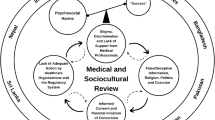Abstract
The clinic is a loaded space for LGBTQI persons. Historically a site of pathology and culturally a site of stigma, the contemporary clinic for queer patient populations and their loved ones is an ethically fraught space. This paper, which introduces the featured articles of this special issue of the Journal of Bioethical Inquiry on “Bioethics, Sexuality, and Gender Identity,” begins by offering an analysis of scrutiny itself. How do we scrutinize? When is it apt for us to scrutinize? And what are the benefits and perils of clinical and bioethical scrutiny? Bearing in mind these questions, the second half of this paper introduces the feature articles in this special issue in response to such forms of scrutiny. How, why, when, and in what ways to sensitively scrutinize LGBTQI persons in the clinic are the aims of this piece.
Similar content being viewed by others
Notes
For a comprehensive analysis of the history and uses of the term “queer” in scholarly discourses, see Annamarie Jagose’s (1997) Queer Theory: An Introduction.
Some areas that have received scholarly attention include: issues regarding intersex children; quarantine and policy-making decisions on AIDS in the earliest years of the epidemic; issues surrounding inclusion or exclusion from the American Diagnostic and Statistical Manual of Mental Disorders (DSM); blood and organ donation policies; gay etiology studies; gay and transgender parenthood; gender-testing in sports; and queer comfort in the clinic. (For examples in these areas, see: Dreger 1998; Panem 1985; Matthews 1988; Rabin 1986; Spitzer 1981; Galarneau 2010; Schüklenk et al. 1997; Stein 1998; Murphy 2010; Simpson et al. 2000; and Harbin, Beagan, and Goldberg 2012.)
For more information about the Project on Bioethics, Sexuality, and Gender Identity, including its consortium, visit www.queerbioethics.org.
References
Ahmed, S. 2006. Queer phenomenology: Orientations, objects, others. Durham, NC: Duke University Press.
Dreger, A.D. 1998. Ambiguous sex—or ambivalent medicine? Ethical problems in the treatment of intersexuality. The Hastings Center Report 28(3): 24–35.
Epstein, S. 1996. Impure science: AIDS, activism, and the politics of knowledge. Berkeley: University of California Press.
Foucault, M. 1990. The history of sexuality, volume 1: An introduction. Trans. R. Hurley. New York: Vintage Press
Foucault, M. 1994. The birth of the clinic: An archaeology of medical perception. Trans. A.M. Sheridan Smith. New York: Vintage Press.
Garland-Thomson, R. 2005. Staring at the other. Disability Studies Quarterly 25(4). http://dsq-sds.org/article/view/610/787.
Garland-Thomson, R. 2009. Staring: How we look. New York: Oxford University Press.
Galarneau, C. 2010. Blood donation, deferral, and discrimination: FDA donor deferral policy for men who have sex with men. The American Journal of Bioethics 10(2): 29–39.
Gould, D.B. 2009. Moving politics: Emotion and ACT UP’s fight against AIDS. Chicago: University of Chicago Press.
Harbin, A., B. Beagan, and L. Goldberg. 2012. Discomfort, judgment, and health care for queers. Journal of Bioethical Inquiry 9(2): 149–160.
Love, H.K. 2007. Feeling backward: Loss and the politics of queer history. Cambridge: Harvard University Press.
Jagose, A. 1997. Queer theory: An introduction. New York: New York University Press.
Matthews, E. 1988. AIDS and sexual morality. Bioethics 2(2): 118–128.
Murphy, T.F. 2010. The ethics of helping transgender men and women have children. Perspectives in Biology and Medicine 53(1): 46–60.
Nelson, J.L. 1998. The silence of the bioethicists. GLQ: A Journal of Lesbian and Gay Studies 4(2): 213–230.
Panem, S. 1985. AIDS: Public policy and biomedical research. The Hastings Center Report 15(4): 23–26.
Rabin, J.A. 1986. The AIDS epidemic and gay bathhouses: A constitutional analysis. Journal of Health and Political Policy Law 10(4):729–747.
Simpson, J.L., A. Ljungqvist, M.A. Ferguson-Smith, et al. 2000. Gender verification in the Olympics. Journal of the American Medical Association 284(12):1568–1569.
Spitzer, R.L. 1981. The diagnostic status of homosexuality in DSM-III: A reformulation of the issues. The American Journal of Psychiatry 138(2): 210–215.
Schüklenk, U., E. Stein, J. Kerin, and W. Byne. 1997. The ethics of genetic research on sexual orientation. The Hastings Center Report 27(4): 6–13.
Stein, E. 1998. Choosing the sexual orientation of children. Bioethics 12(1): 1–24.
Terry, J. 1999. An American obsession: Science, medicine, and homosexuality in modern society. Chicago: University of Chicago Press.
Treichler, P.A. 1999. How to have theory in an epidemic: Cultural chronicles of AIDS. Durham, NC: Duke University Press.
Wahlert, L., and A. Fiester. 2012a. Queer bioethics: Why its time has come. Bioethics 26(1): ii–iv.
Wahlert, L., and A. Fiester. 2012b. Commentary: The questions we should not ask. Cambridge Quarterly of Healthcare Ethics 21(2): 282–284.
Author information
Authors and Affiliations
Corresponding author
Rights and permissions
About this article
Cite this article
Wahlert, L., Fiester, A. Questioning Scrutiny. Bioethical Inquiry 9, 243–248 (2012). https://doi.org/10.1007/s11673-012-9376-9
Received:
Accepted:
Published:
Issue Date:
DOI: https://doi.org/10.1007/s11673-012-9376-9




